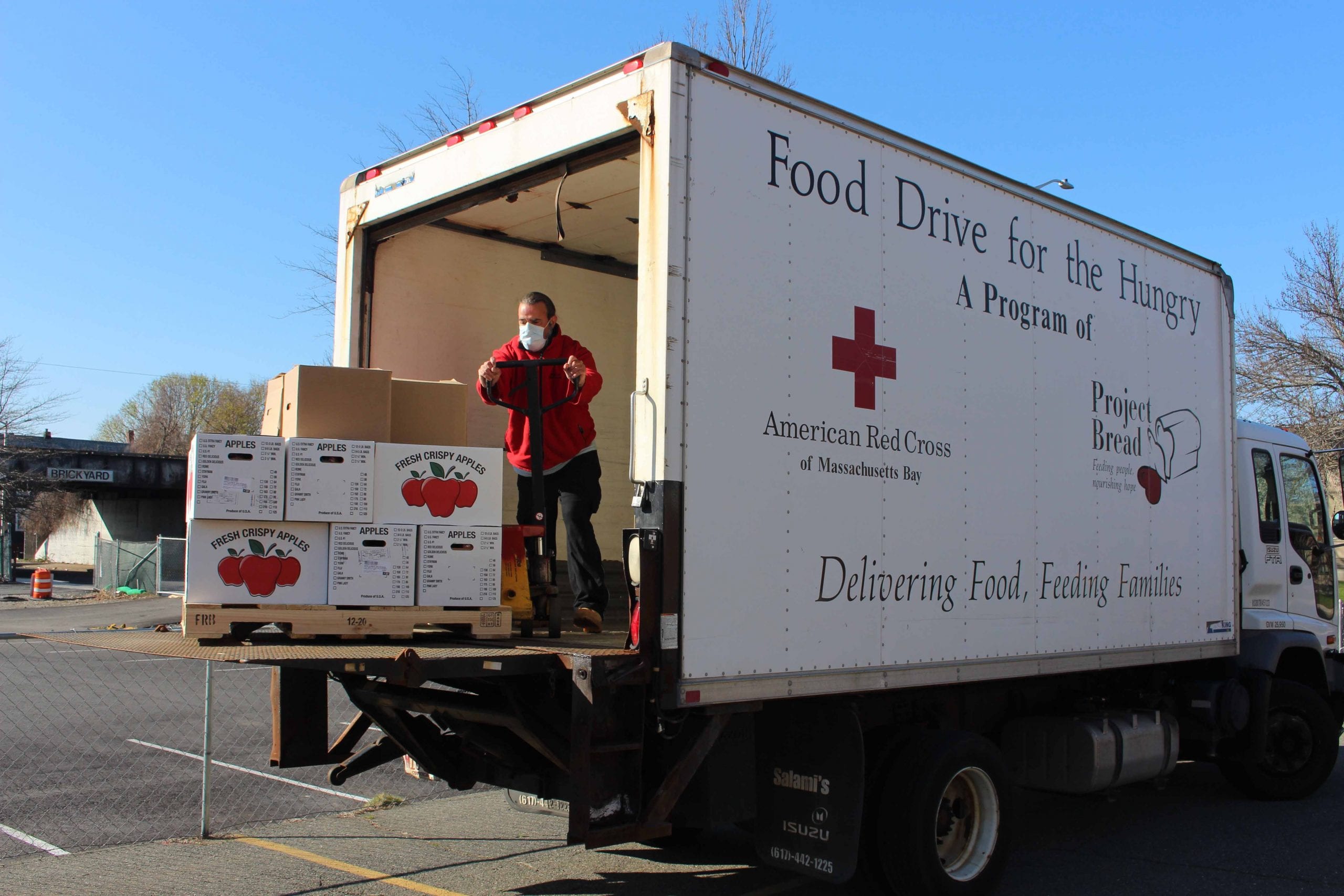The American Red Cross has increased its donations to local food banks that serve Lynn, Chelsea and Revere — three communities that have been battered by the coronavirus pandemic.
Citing the increased need, Red Cross spokesman Jeff Hall said their food donations are now made on a weekly basis to Leading Through Empowering Opportunities (LEO Inc.) in Lynn and Community Action Programs, Inter-City Inc. (CAPIC), which serves families in Chelsea and Revere.
The change is notable, Hall said, as the Red Cross has typically made donations, which are provided through a partnership with the Greater Boston Food Bank, on a monthly basis. Following the Red Cross weekly drop-offs, LEO Inc. and CAPIC identify where the need is and make the food available for on-site pick-up or deliver it to families and individuals who can’t make the trip.
Since the COVID-19 outbreak started, he estimates the organization’s food deliveries have served 300 families and 925 individuals through LEO, 40 percent of whom are children, and 330 families and 1,075 individuals in Chelsea and Revere, 435 of whom are children.
“We definitely know a lot of at-risk families that we already serve are most likely further at risk because of the COVID pandemic,” said Hall. “We know a lot of families that were living paycheck to paycheck are mostly out of work right now. It’s hard to explain that to a child so we’re trying to work with these local food banks in Lynn, Chelsea and Revere to make sure they can get more food to help people locally in their communities.”
For the past several years, the Red Cross has been coming to LEO Inc. once a month to provide the organization’s families with dairy products, proteins, vegetables, and rice, but the increased output throughout the global health crisis has been “such a benefit to our families,” said Marilyn Perry, health and nutrition director for LEO.
Rather than receiving 200 boxes of food, which serves about 200 families, Perry said Red Cross now provides enough for 300 families, at 75 boxes a week. That output almost covers the 350 families LEO serves, Perry said, noting that each box provides about five days worth of food for a family.
Perry said LEO, which administers a Head Start program, has seen about a 40 percent increase in families seeking food donations throughout the COVID pandemic. Along with the Red Cross, LEO has partnered with the Salvation Army and My Brother’s Table to cover the increased community need.
“I feel like our families are not fully covered but we are really helping the need with the families we service,” said Perry. “It’s just been wonderful for us to be able to provide (food). It’s sad that it is a need, but I am so grateful for them because I feel it’s taken such a large burden off of families. It’s one less thing they have to worry about on a daily basis.”
The increased donations to CAPIC, which serves 215 Head Start families with children 3-5 years old in Chelsea and Revere, have been sorely needed, said Dianne Curtin, director of CAPIC Head Start.
Curtin said the Red Cross has been able to step up during a time when families are waiting in line for hours at food banks across the country. Pictures that have routinely been posted on social media throughout the pandemic show traffic backed up for miles in high need areas.
At the CAPIC distribution site, Curtin said before, there were families lining up in the street for food. At times, there were young children waiting in line with their parents, but in other instances, families had opted to leave their children at home while they waited. Neither is an ideal situation, Curtin said, which has been blunted somewhat by the increased food availability.
“Without increased donations, I don’t know where we would have been,” said Curtin. “Honestly, it’s just been an amazing, amazing help to our families. In Chelsea and Revere, the situation is pretty dire. For us to be able to deliver boxes right to families with young children so they don’t have to bring their children out is exactly what our families need right now.”
For families who don’t have access to transportation or just can’t make the trip, Curtin said CAPIC staff delivers food right to their homes. A majority of their families have lost their employment, or are sick, quarantined and can’t leave their homes, she said.
For instance, during one such delivery, Curtin said a Chelsea woman mentioned after opening her door that it was the first time she had stepped outside since March. The city has the worst infection rate in the state and has become a coronavirus hot spot.
“That’s the level of fear and stress in Chelsea right now,” said Curtin. “It’s a combination of fear of becoming infected and also a fear of government, (for those who are not) documented. Red Cross and Head Start are trusted by them because Head Start has been coming out each month.”

